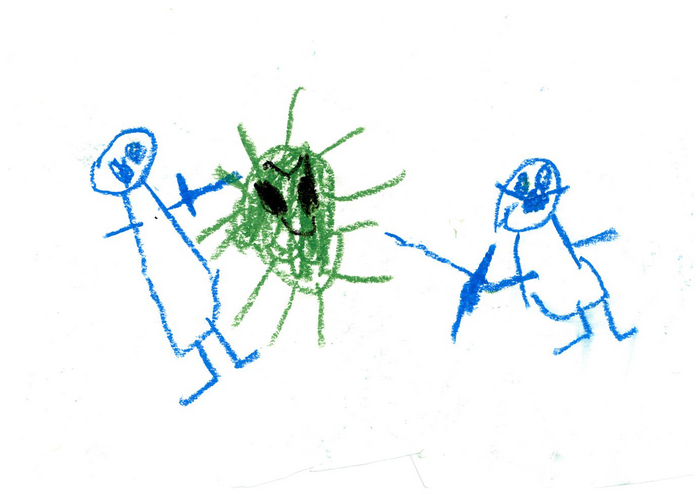Detailed images of illness, death and cancelled activities; these were some of the common themes of children’s drawings during the COVID-19 pandemic. A new study from Uppsala University, in which researchers studied 91 drawings made by children aged between 4 and 6, shows that the pandemic affected the children significantly and that they had extensive knowledge about the disease.

Credit: Swedish Archive of Children’s Art
Detailed images of illness, death and cancelled activities; these were some of the common themes of children’s drawings during the COVID-19 pandemic. A new study from Uppsala University, in which researchers studied 91 drawings made by children aged between 4 and 6, shows that the pandemic affected the children significantly and that they had extensive knowledge about the disease.
It is not every day that children’s drawings become the focus of a scholarly article. In the new study published in the journal Acta Paediatrica, however, the research was entirely based on drawings about the pandemic. The researchers collected all of the drawings produced by children between the ages of 4 and 6 that had been submitted to the Swedish Archive of Children’s Drawings between April 2020 and February 2021.
“It was a very fun study to carry out. I was actually quite uncertain as to whether a medical journal would publish the article, but they did, including the children’s drawings and everything,” explains Anna Sarkadi, Professor of Social Medicine and leader of the study.
Using a method of analysis whereby children’s own explanations of their image were combined with a visual analysis of the drawings, the researchers were able to show that even younger children were strongly affected by the pandemic. They drew detailed images of illness, death and cancelled activities. Fear, worry and missing grandparents were common themes. Some children described the coronavirus as a monster, while others described how to protect yourself. One drawing depicted two children in a fencing battle against a giant virus.
“The drawings were often covered in a lot of snot. On one drawing, a child wrote: ‘You throw up, then you cough, then you feel better or die,’ with extremely clear illustrations,” explains Maria Thell, doctoral student in the CHAP research team and one of the authors behind the study.
The children also had a high level of health literacy related to COVID-19, i.e. knowledge of the virus’s characteristics, how it spread and what symptoms the disease could cause. The project was part of investigations into children’s voices in the public space during the pandemic.
“As a researcher with a background in child and youth science, I would love to develop this method further,” adds Thell.
The team will continue the research at the request of the Public Health Agency of Sweden, which has tasked them with analysing drawings made by 7–11-year-olds during or just after the pandemic.
Sarkadi, A, Thell, M, Jirblom, K. Perceptions of the COVID-19 pandemic as demonstrated in drawings of Swedish children aged 4–6 years. Acta Paediatr. 2023; 00: 1– 9. https://doi.org/10.1111/apa.16706
Contact:
Anna Sarkadi, Professor of Social Medicine at the Department of Public Health and Caring Sciences at Uppsala University, [email protected], 070-611 36 91 070-611 36 01.
Maria Thell, doctoral student of Social Medicine at the Department of Public Health and Caring Sciences at Uppsala University, [email protected], phone: 018-471 66 73, mobile: 073-469 76 49.
Journal
Acta Paediatrica
DOI
10.1111/apa.16706
Method of Research
Observational study
Subject of Research
People
Article Title
Perceptions of the COVID-19 pandemic as demonstrated in drawings of Swedish children aged 4–6 years.
Article Publication Date
11-Feb-2023




